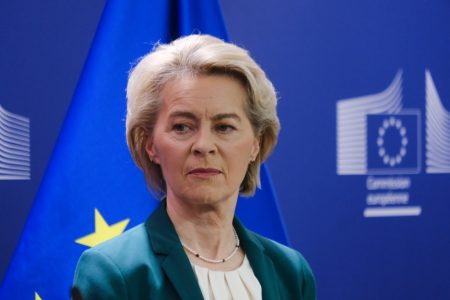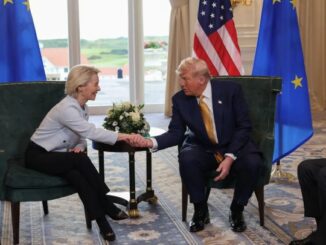
Hoping to be reelected for a second term as European Commission President, Ursula von der Leyen laid out her vision for boosting Europe’s competitiveness in global markets, including implementing existing regulations and new proposals, in her political priorities for the next EU 2024-2029 mandate on Thursday (18 July).
EPP candidate Von der Leyen will face a vote at the European Parliament today to determine whether she will be elected to another term.
Since the European Council nominated her for a second term on 27 June, she has been busy courting smaller parties across the political spectrum to achieve the necessary majority for parliamentary approval.
“Europe’s competitiveness is hamstrung by its lower productivity compared to its direct global competitors,” wrote the EU Commission president candidate, proposing to better diffuse technology across sectors.
The Commission will ramp up the enforcement of existing regulations, such as the content moderation-focused Digital Services Act (DSA) and competition-oriented Digital Markets Act (DMA), so that Big Tech “assumes responsibility,” she wrote.
Tech took up a large part of the priorities document, compared to its relative absence from previous party manifestos. Her approach is broadly in line with former Italian prime minister Enrico Letta’s high-level report on Europe’s single market future in April.
Artificial intelligence
Von der Leyen proposed three measures directly related to artificial intelligence (AI).
First is improving access to AI computers in her first 100 days through an AI Factories initiative. This appears to ramp up an existing policy to set up data centres that small businesses and startups can use to access AI resources.
The candidate Commission president said she will propose and “Apply an AI strategy to boost new industrial uses of AI and to improve the delivery of a variety of public services, such as healthcare.”
She also proposed the creation of an AI Research Council to “pool resources,” similar to the cross-European physics lab CERN.
To support the development of AI and other frontier technologies, von der Leyen drew attention to the importance of data access for companies.
“Europe needs a data revolution,” so she will propose a “European Data Union Strategy” to simplify the legal framework for sharing data at scale while keeping privacy and security in mind.
Investment
“This mandate is the time for investment,” Von der Leyen told MEPs in her speech on Thursday morning.
Von der Leyen proposed a series of measures to improve access to capital for EU companies, saying Europe needs “liquid capital market and a competition policy that support companies to scale up” because strategic technologies “must be made in Europe,” and that innovative companies remain in Europe she told MEPs on Thursday.
She wrote in her text on priorities she will increase researching spending with an eye on new technology, including a new Competitiveness Fund for strategic technologies like AI, space, and biotech.
Sets of “common interest” projects invested in are to be announced in early 2025.
Biotech will get its own Act in 2025 to speed up how quickly products go from labs to factories, she said.
The European Research Council and European Innovation Councils will be “expanded,” she said. These two bodies aim to boost investments in cutting-edge research and the scaling up of startups.
Competition
Von der Leyen proposed reviewing existing competition policy to keep up with global markets.
The issue of competition has been a thorny one, with questions as to whether current rules allow for large European companies to emerge, particularly in telecoms. The Commission has also been implementing the DMA, which targets large big tech companies that act as gatekeepers in the digital economy.
Von der Leyen also wants to revise the Public Procurement Directive to give preference to EU products for strategic sectors.
Society and tech
To support these initiatives, von der Leyen also wants to boost the availability of skilled labour in these sectors. Among other things, she proposed a Science, Tech, Engineering, and Mathematics Education Strategic Plan to address the “worrying decline” of qualified teachers in this area.
In a nod to previous initiatives by MEPs on addictive design, von der Leyen said she will propose a “right to disconnect” from digital technologies with a view to improving mental health.
“My heart bleeds when I read that teenagers take their lives because of online abuse,” she told MEPs.
Take the Survey at https://survey.energynewsbeat.com/





